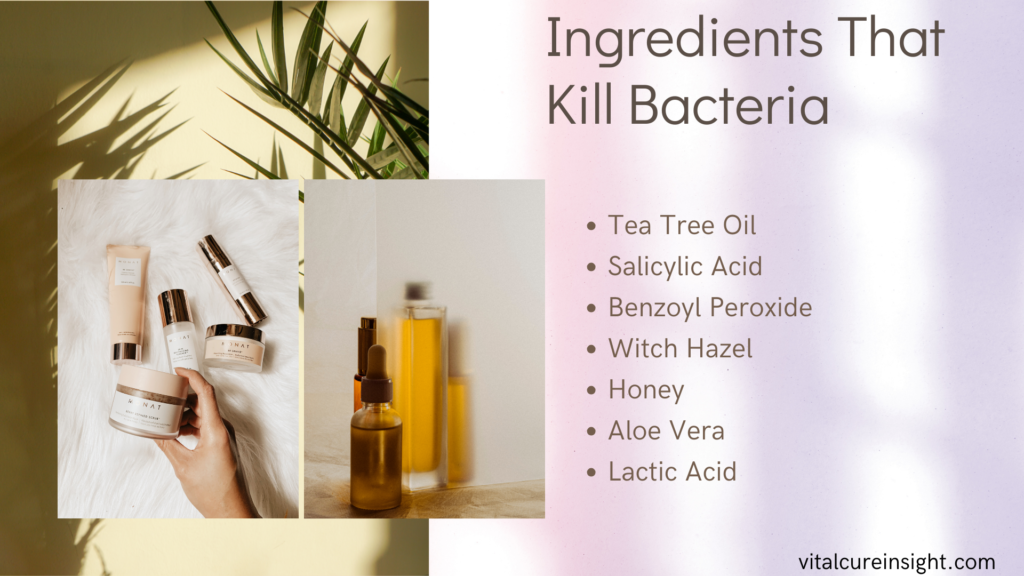Introduction
Skincare is essential for keeping your skin healthy. But have you ever wondered if your skincare products actually kill bacteria? While some products fight bacteria effectively, others may not work as expected. So, it is important to know what to look for in the right skincare routine. In this article, we will explore the best ways to ensure your skincare helps keep bacteria away.
Why Bacteria on Skin Matters
Before diving into the best antibacterial skincare, let’s first understand why bacteria are a concern. Your skin naturally has both good and bad bacteria. While good bacteria help protect your skin, bad bacteria can cause infections, acne, and irritation. Therefore, choosing the right skincare is crucial for maintaining a balance and preventing breakouts. Additionally, knowing which products work best can save you from unnecessary skin issues.
Ingredients That Kill Bacteria

When choosing skincare, it is essential to look for ingredients that effectively fight bacteria. Here are some of the best ones:
- Tea Tree Oil – A natural antibacterial that helps reduce acne-causing bacteria.
- Salicylic Acid – Exfoliates and clears clogged pores, making it harder for bacteria to grow.
- Benzoyl Peroxide – One of the strongest ingredients to kill acne-causing bacteria.
- Witch Hazel – Has natural astringent properties that help remove bacteria from the skin.
- Honey – Contains natural antibacterial properties and soothes the skin.
- Aloe Vera – Not only heals the skin, but it also prevents bacterial infections.
- Lactic Acid – Helps exfoliate and maintain a healthy skin barrier, preventing bacterial overgrowth.
By incorporating these ingredients into your skincare routine, you can significantly reduce bacterial growth on your skin.
Skincare Routine for Killing Bacteria
To get the best results, it is crucial to follow a skincare routine that actively removes bacteria while keeping your skin healthy. Here is an easy and effective routine:
- Cleanser – Use an antibacterial cleanser with tea tree oil or salicylic acid to remove dirt, oil, and bacteria.
- Toner – Apply toner with witch hazel to tighten pores and eliminate bacteria.
- Serum – Use a serum with benzoyl peroxide or lactic acid to treat bacteria-prone areas.
- Moisturizer – Choose a lightweight, non-comedogenic moisturizer to keep the skin hydrated without trapping bacteria.
- Spot Treatment – Apply honey or aloe vera to soothe and heal any breakouts.
- Sunscreen – Never skip sunscreen! It protects the skin from damage and maintains its natural barrier.
By following this routine daily, your skin will stay clean and free from harmful bacteria. Furthermore, consistency is key to seeing long-term benefits.
Common Skincare Mistakes That Encourage Bacteria
Many people unknowingly make mistakes that can increase bacterial growth. To keep your skin safe, it is important to avoid these common errors:
- Skipping face washing – Not cleansing your skin properly allows bacteria to build up.
- Touching your face – Your hands carry bacteria, so avoid touching your face frequently.
- Using dirty makeup brushes – Always clean brushes and sponges to prevent bacterial infections.
- Over-exfoliating – Exfoliating too much can strip your skin’s natural barrier, making it vulnerable to bacteria.
- Sharing skincare products – Bacteria can transfer from one person to another through shared products.
By avoiding these mistakes, you can significantly reduce bacterial growth and keep your skin healthy. Additionally, being mindful of your habits will make a huge difference in the long run.
Natural Ways to Reduce Bacteria on Skin
Besides using antibacterial skincare, you can also follow some natural methods to prevent bacterial infections. Here are a few effective tips:
- Drink plenty of water – Hydrated skin stays strong and fights bacteria better.
- Eat a healthy diet – Foods rich in vitamins and antioxidants improve skin health.
- Use a clean pillowcase – Change your pillowcase often to prevent bacteria transfer.
- Get enough sleep – Rest helps your skin repair and stay balanced.
- Practice good hygiene – Regular hand washing reduces bacteria that can spread to your face.
By combining good skincare with these habits, you can naturally keep your skin bacteria-free. Moreover, adopting these practices will benefit your overall health as well.
Conclusion
So, does your skincare kill bacteria? The answer depends on the ingredients and how you use them. Choosing the right antibacterial products, following a proper routine, and maintaining good hygiene can help protect your skin.
Key Takeaways:
- Choose skincare with antibacterial ingredients like tea tree oil, salicylic acid, and benzoyl peroxide.
- Follow a consistent skincare routine to prevent bacterial buildup.
- Avoid common skincare mistakes that allow bacteria to grow.
- Use natural methods to support skin health and reduce bacteria.
At the end of the day, taking care of your skin the right way will help you stay fresh, glowing, and free from harmful bacteria! Furthermore, understanding your skin’s needs and making informed choices will lead to long-term benefits.
For more details, visit: Vital Cure Insight


